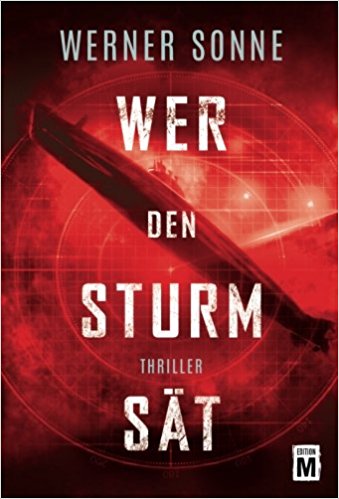(THIS ARTICLE IS MACHINE TRANSLATED by Google from Norwegian)
«The noble art of lying» is Oscar Wilde's definition of the poetry profession. When the poetry seems more real than the real, we are over in the mental genre resolution. Specifically, this happens where fantasy and facts merge into a higher unity. German Werner Sonne, author and TV journalist with long correspondence experience from Bonn, Warsaw and Washington, moves elegantly around this border country. As in the thriller Where the storm sat – "The one who starts the storm".
Facts meet fiction. In the real world, a Russian fighter jet almost snaps an American reconnaissance aircraft after the crew caught a US-B-52 bomber on the radar. In Werner Sonne's fiction, a Russian bomber collides with a German fighter jet and triggers an escalating east-west crisis. A crime riddle – a suspicious death on the German holiday island of Sylt – is the framework around this just slightly camouflaged analysis of today's big politics. Sonne often writes case prose on political issues, so why not in the form of romance this time?
The author is a 71-year-old white-maned gentleman, who dropped out of school as a 16-year-old, took a job as a journalist and has been on his reading page, among other things as a presenter for Germany's most important state television station ARD. Over the years, he has moved in many different international arenas, and followed state leaders all over the world closely. Gradually, these experiences have found their place in Sonne's fiction. "A lot of professional literature on politics and politicians remains dry analyzes and ends up in a dusty bookshelf. I want to convey world politics through entertainment, "he says of his latest release.
The writer's toolbox. Sonne Genre selection gives him the freedom to crawl under the skin of big politics heavyweights. He equips them with feelings, thoughts and doubts. We willingly follow the author past the scarce news picture we are daily fed, and sit as if on needles when describing the outrageous near-catastrophes that unfold in the book.
Sonne's role as a high-profile political reporter is a unique platform to print from. A well-known quote from him reads: "Now you have failed to answer my question twice. Think twice before doing it again. " His ethical standard has enabled him to strike a fine balance between closeness and distance to his interviewees, and to treat sensitive topics with sobriety – such as Germany's relationship with Israel. With his elegant style, he makes use of kårde where others grab the sledgehammer: “We have come to a conviction here in Germany: Never again war. Israel has in many ways concluded the opposite: Never again Auschwitz. " At the same time, Sonne is just as objectively critical of his own country: "I am not a pacifist, on the contrary: I think we must take a serious round with ourselves when it comes to Germany's role, and the question of whether we can always avoid conflict because we so reluctantly put our soldiers in action. Instead, we supply weapons. "
We have come to a conviction here in Germany: Never more war. Israel has in many ways concluded the opposite: Never more Auschwitz.
The mechanics of escalation. Sonne's core theme i Where the storm sat is to make the reader aware of the time we live in – a time that seems to be moving backwards. A menacing time, which we must return to the end of the Cold War to find our way. It is as if two trains are raging against each other and are no longer to stop. A chaplinic pas de deux with the globe, as most likely, as in dictators, will end with a bang. A time when long-forgotten enmity is revived. A macho leader on every side of the Atlantic who, with his peace-through-force rhetoric and ill-concealed nuclear threats, can make it go cold down our backs.
Reader off Where the storm sat in other words, served more than lovely crimson. He or she can study a process that we all face from time to time: that a problem becomes really big first through the way we tackle it. The drowning at Sylt, in a swimming pool at a luxury hotel, appears at first to be an ordinary heartbeat. But the poison that is discovered in the body of the deceased causes the snowball to start rolling. We are taken to Russia, where the "strong in the Kremlin" puts both renters and a submarine in action to eliminate one who sticks in the wheels for an illegal arms sale agreement. When the submarine leaves in forbidden waters and the Kremlin cannot ask for help, the drama escalates; The murder mystery and the submarine are suddenly two sides of the same issue. Thus, we are suddenly faced with a deadly threat to world peace.
Sonne uses the full range of his reporter experience to present a plot we have every reason to fear. This is not exciting because we wonder who the villains are; It is exciting because we wonder how far they are willing to go.


